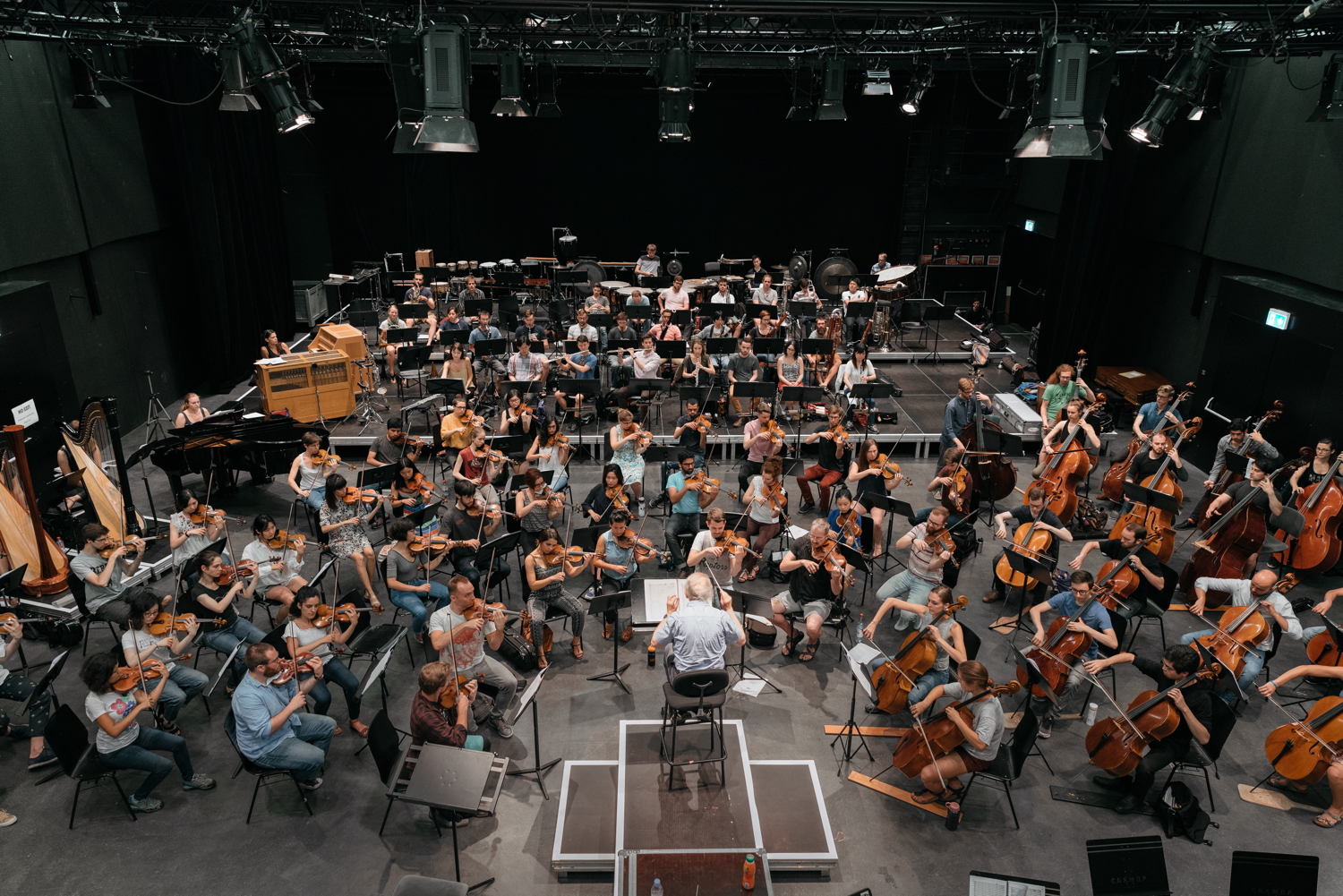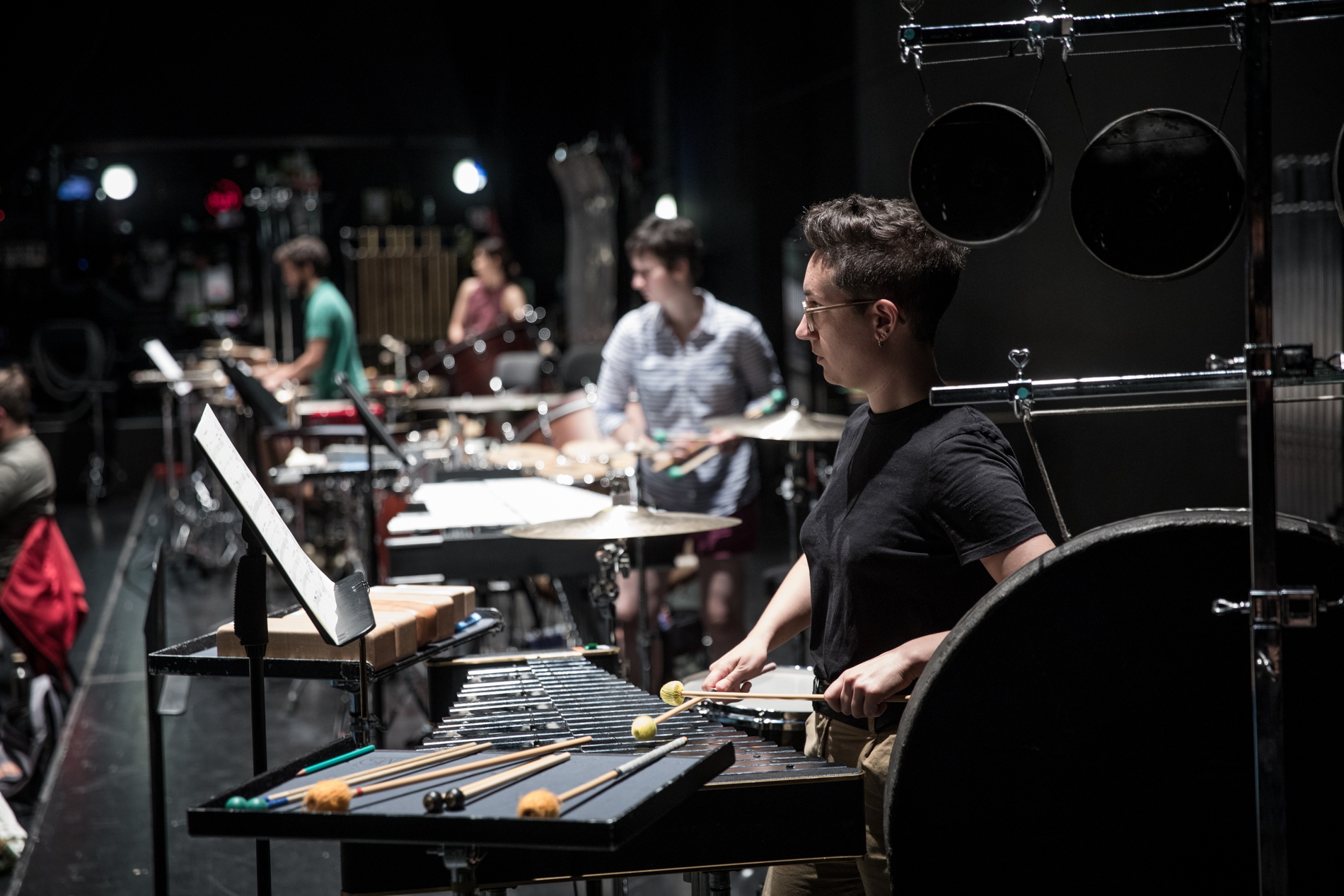Just beautiful concerts? No. At the Lucerne Festival, an academy looks after young musicians and theis interests, be it instrumentalists, composers and/or conductors. The Lucerne Festival Academy brings them all together. Festival director Michael Haefliger and composer and conductor Pierre Boulez came up with the idea for this academy 20 years ago.
Benjamin Herzog
It’s a hot saturday afternoon by the Lake Lucerne and the Lucerne Festival has been running at full speed for a good week now. This applies not only to the dense sequence of concerts, debut recitals and free formats for visitors in front of and next to Jean Nouvel’s emblematic Culture and Convention Centre KKL. The first three weeks of the festival are very intense for the participants of the Lucerne Festival Academy as well. 110 in number, from 30 different countries: Instrumentalists, composers and conductors. Some of them will be presenting the fruits of their first phase of work in a concert this Saturday afternoon at the KKL. Pierre Boulez’ enormously difficult Rituel in memoriam Bruno Maderna for eight instrumental groups, Wolfgang Rihm’s In-Schrift and a piece by Lisa Streich called Ishjärta, which translates “iron heart” in English and in which the composer attempts to express two different emotional states simultaneously.

The interaction between performers, lecturers and learners makes sense. British composer Eden Lonsdale, a participant in the Composer’s Programme, says: ‘Working with an orchestra shows you what you have concretely written on your score.’ Chinese composer Yixuan Hu is also happy regarding the artistic-pedagogical triangle built by academy orchestra, conductor and teacher. ‘This collaboration here is unique,’ she says. ’You can get very far very quickly.’ In seminars this year, twelve composers of orchestral music and smaller ensemble pieces discuss new pieces with composers Dieter Ammann and Unsuk Chin, who stood in for Wolfgang Rihm this year, as he passed away in July. The tone is friendly but direct with the clear intention of bringing theory and practice together.
Young composer Wolfgang Rihm shocked the audience with his orchestral work ‘Sub-Kontur’ at the Donaueschinger Musiktage in 1976, Lucerne Festival Contemporary Orchestra, conducted by Sylvain Cambreling, SRG/SSR in-house production.
With its own orchestra, the Lucerne Festival Contemporary Orchestra (LFCO), the Composers Programme, an initiative for conductors who want to deepen their knowledge of new music, and workshops where Academy members can discuss practical performance issues with invited experts from ensembles such as the Ensemble Intercontemporain, Frankfurt’s Ensemble Modern and Klangforum Wien, the Lucerne Festival Academy is broadly based. A management workshop and two prizes, the Fritz Gerber Award for instrumentalists and the Roche Young Commissions for composers, round off the programme.
Three weeks of campus atmosphere
Three weeks of campus atmosphere, full of encounters. Former academy students say that the network built up in Lucerne has helped them in their artistic careers, be it for specific questions about a notation, a playing or conducting problem, or simply in a friendly way. The Lucerne Festival itself also actively cultivates bonds between former and current academy members: an alumni programme actively involving former participants in the ongoing academies was founded in 2016.
The LFCO performed this year’s composer in residence ‘Reigen’ as a spontaneous pre-programme to the festival opening concert in KKL’s main hall, LFCO, SRG/SSR in-house-production.
Composer and conductor Pierre Boulez, who died in 2016 and founded the academy 20 years ago together with Lucerne Festival’s artistic director, Michael Haefliger, explained in an 2016 (the founding year) interview that 20th and 21st centuries’ culture was ‘neglected in educational institutions’, which is why such an academy was urgently needed. It would otherwise be ‘hardly possible’ to concentrate on this repertoire for three weeks over the course of the year. The sceptical attitude of universities towards modern music has certainly changed since then. But concentrated work, as students can tell you, is often made impossible during the semester due to the many other commitments.

Wolfgang Rihm, whose role at the Lucerne Festival Academy became leading after Boulez’s death, saw the academy as a necessary and logical addition to the Festival rather than as a special organisation for avant-garde music. According to Rihm, the Academy’s musicians should ‘understand modernism from its roots. These roots reach far and wide and at some point go back to the Romantic repertoire.’ In other words, to Brahms or Schönberg, who play a key role. It is symptomatic that Schoenberg’s monumental Gurrelieder – characterised by both the apotheosis of Romanticism and the emergence of modernism and thus perfectly combining the two festival ideas of ‘concert’ and ‘academy’ – will be performed this year.
Arnold Schönberg accompanies the LFCO throughout the festivals. In 2019, the orchestra performed his five orchestral pieces op 1, LFCO, conductor Riccardo Chailly, concert 8.9.2019, KKL Lucerne, in-house production SRG/SSR.
During this hot Saturday afternoon’s concert with the Lucerne Festival Contemporary Orchestra, the high standard at which modern and contemporary music is performed here becomes plain to hear. The orchestra, although most of the musicians met for the first time a week ago, easily mastered the sometimes adventurous difficulties with astonishing precision. With its diverse and large academy, the festival takes on work, it actually wouldn’t be supposed to. After all, music schools and academies should be responsible for the next generation and yet, for a classical music festival, the link with the future generations is of course also one with its own future.
Benjamin Herzog
Pierre Boulez, Eden Lonsdale, Yixuan Hu, Ensemble Intercontemporain, Ensemble Modern, Klangforum Wien, Fritz Gerber-Award, Roche Young Comissions, Unsuk Chin
broadcasts SRF Kultur:
Musik unserer Zeit, 4.9.2024, SRF 2 Kultur, 20 Jahre Lucerne Festival Academy, Autor Benjamin Herzog.
Musikmagazin, 24.8.2024, SRF 2 Kultur, Komponieren an einem Epochenübergang – Lisa Streich, Autor Benjamin Herzog
neo-profiles:
Lucerne Festival Contemporary Orchestra (LFCO), Lisa Streich, Dieter Ammann

